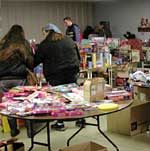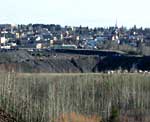By Bob Kelleher
Minnesota Public Radio
December 27, 2001
|
| RealAudio |
A year ago, Minnesota's iron mining industry employed nearly 4,500 workers. By the year's end the number has dropped one-third. Northeast Minnesota is reeling from a double punch - the national recession, and a steel industry in crisis. The fallout is spreading well beyond the 1,400 households of displaced iron workers. It's hitting some of the region's most vulnerable residents.
| |
|
|
|
||
They managed to have Christmas on the Iron Range, despite a year with little to celebrate. In the town of Virginia, dozens of mostly young women were picking out toys and clothing last week, in a room dubbed Santa's Workshop. The Salvation Army's annual gift giveaway is a godsend for some families, including Wendy Watkins and her four kids.
"They give you gloves, and they give you hats," says Watkins. "They've got food for you for the meal - to actually have Christmas meals, so you don't have to do something out of the box or the can. It just kind of makes a real Christmas."
Watkins is one of the lesser-noticed casualties of the economic crisis. She didn't work in mining at all. She worked on computers in a local call center.
"I just lost my job, so I don't have a lot of money coming in. And for me to find another one probably wouldn't happen," Watkins says.
It's an old story. Few jobs and a lot of people looking. LTV Steel's closing in January displaced more than 1,300 workers. Other mines have trimmed another 150 jobs.
The Salvation Army is getting stretched thin. Its annual fund drive in Virginia is keeping up with expectations, but it's serving more meals, and writing more checks for rent and utility assistance. Director Lee Morrison sees a lot of laid-off taconite workers coming for help.
| |
|
|
|
||
"There are a lot of people who are not working directly at the mines - working at McDonalds or other restaurants and fast foods. They, too, are feeling the crunch right now, because they are not getting the hours they would have gotten in the past," says Morrison.
There are new jobs coming in. Fifty were created this year at an electronics firm in Hibbing, and 150 at a travel call center in Ely. Blue Cross Blue Shield promises 200 more. But few of the new jobs will pay as much as those lost in taconite mining.
"The economic impact of one LTV is not going to be offset by other firms adding 25 or 30 jobs at $8.50 to $10 an hour," says Tony Barrett, an economist at Duluth's College of St. Scholastica. "It takes more than one job to replace one LTV job."
It's a fundamental shift in the work force, according to Scott Moore, a labor market analyst for the Minnesota Workforce Center in Duluth.
"One way to look at it is that we're trading some of the higher-paying occupations for lower-pay occupations," says Moore. "The other thing that's happening is - we're taking employees who have been employed for a number of years, and they are now starting off in new occupations. So their new starting wages will not be as high as some of the wages they have left."
And those starting wages are barely enough for many families to live on. Jerry Fallos, president of the labor union for LTV's displaced steelworkers, says the new jobs don't even pay enough to supplement other income.
| |
|
|
|
||
"What people are looking for now are jobs to supplement their pensions and to get insurance. That's the biggest fear now - that we're going to lose our insurance," says Fallos.
Maintaining health insurance is a big worry for the area's oldest residents. LTV Steel has promised to carry retirement and medical benefits only through February. Fallos says as many as 7,000 northeast Minnesotans - retirees, surviving spouses and family members, stand to lose medical coverage.
Many younger workers already feel the loss of medical coverage they can't afford to continue. Former LTV worker Jodie Koroschec is counting on good health while she trains for a new career.
"I'm one of those that's without insurance. I have none anymore," she says.
Koroschec's insurance covers just her three kids.
Iron Rangers are hoping for the big fix. Two huge projects have been proposed for the area - a steel plant in Keewatin and a power plant for Hoyt Lakes. Neither will be up and running for years.
More realistic hopes rest with President Bush. He'll decide by mid-February on tariffs recommended against foreign steel imports. If the tariffs are put in place, demand could pick up for Minnesota taconite. That could restore at least a few of the jobs lost, in a very bad year for mining.
More from MPRMore Information



